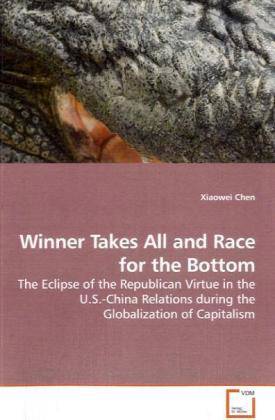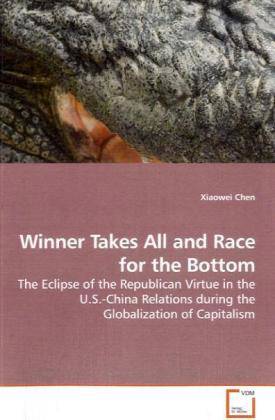
- Afhalen na 1 uur in een winkel met voorraad
- Gratis thuislevering in België vanaf € 30
- Ruim aanbod met 7 miljoen producten
- Afhalen na 1 uur in een winkel met voorraad
- Gratis thuislevering in België vanaf € 30
- Ruim aanbod met 7 miljoen producten
Zoeken
Winner Takes All and Race for the Bottom
The Eclipse of the Republican Virtue in the U.S.-China Relations during the Globalization of Capitalism
Xiaowei Chen
Paperback | Engels
€ 77,95
+ 155 punten
Omschrijving
This book is the first Communitarian examination of the policy tradeoff of the U.S.- China relations during the Clinton administration (1992-2000): whether could the policy tradeoff claim to have the support of public opinion? whether did the media discourse originate from an active civic participation? and how does the policy tradeoff break its promise? By content analyzing the media discourse, the author examined: (1) who said what; (2) which perspective prevails; (3) the correlation between newsmaking and policy-making; and (4) the congruence/dissension between policy beltway and other social groups. As a result, the author concludes that the eclipse of co-operative inquiry of the U.S. public, the ascendancy of issue management of special stakeholders, and the entanglement between newsmaking and policy-making have jeopardized the republican virtue of U.S. diplomacy. More importantly, the author indicates that all this could be worsened with the global expansion of capitalistic ideology which promotes a modern aristocracy placing economic efficiency above all other values" (Lionel Jospin).
Specificaties
Betrokkenen
- Auteur(s):
- Uitgeverij:
Inhoud
- Aantal bladzijden:
- 220
- Taal:
- Engels
Eigenschappen
- Productcode (EAN):
- 9783639173963
- Uitvoering:
- Paperback

Alleen bij Standaard Boekhandel
+ 155 punten op je klantenkaart van Standaard Boekhandel
Beoordelingen
We publiceren alleen reviews die voldoen aan de voorwaarden voor reviews. Bekijk onze voorwaarden voor reviews.








